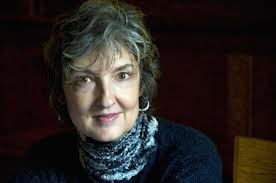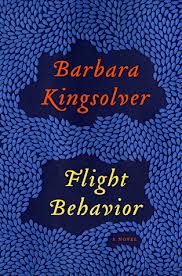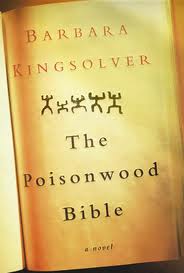Back on November 9th I had the pleasure of watching a live interview with my favorite literary novelist, Barbara Kingsolver, on Goodreads. She’s the best-selling, award-winning author of such books as THE BEAN TREES, THE LACUNA, and my personal favorite, THE POISONWOOD BIBLE, and now has a new book out entitled FLIGHT BEHAVIOR.
I thought I’d share some of the highlights (for me, at least). The interview was conducted by Patrick Brown, Goodreads Director of Community, but invited viewers could pose questions of their own. (No, mine didn’t get featured, but then I didn’t expect them to be.)
One viewer asked about how she achieves the knack of getting a message across (as I recall, the questioner termed it as a kind of “progressive, eco-consciousness”) without it coming off like a lecture. Ms. Kingsolver replied, as follows:
The knack is very simple. Respect my reader and respect the complexity of my subject. A novel is far more subtle than marketing or advertising or activism. In fact, I think literature is one of the few places we go to be renewed or enriched without being told what to think. That’s core to me as a writer. I’m not going to tell you what to think. As it happens, because I was trained as a scientist and all my education is in science and not writing, I carry through the world a scientist’s eye and a scientist’s mind and an awareness of biological matters…and an awareness that I’m surrounded all the time by millions of others species. That I’m not the only one. That, to me, seems simply true. To others, it may seem like eco-consciousness or something.
I loved that one sentence I highlighted in bold. That’s how I feel. I dislike books that blare a certain philosophy or attitude, for I want to form my own conclusions. It all comes back to her first response to the question. Good literature respects the reader.
Some other highlights:
- “It is my responsibility as a writer to make sure my book is as accessible as possible.”
- “The Poisonwood Bible is a political allegory. This family stands for what the Congo was going through at the time.”
- “I revise infinitely. I love working on a computer for that reason. A first draft is something that has to be hammered out to make sure I can get from the beginning to the end. After that, I become a trapeze artist…Revision is the thrilling part for me…The first sentence makes a promise the rest of the book will keep. The first paragraph enlarges that promise.”
- “Sense of place only comes from having been there…If you haven’t been there, you don’t know what the rain smells like…So I always go to the place I’m writing about.”
When asked about the role of the novel in politics, she responded this way, repeating her earlier mantra:
“My job is to respect the reader. I’m not here to tell you what to think or what to do. Literature…can change the way people think or what they do, but it does it through empathy. A novel puts you straight inside another brain. That is, by its nature, a life-changing act. It can be a political act to create empathy for the stranger.”
(This meant a good deal to me personally, for that is something I’ve tried to do in my first two novels. With THE RECKONING, I wanted to create empathy for an Iraqi or a Kurd at a time when Americans certainly regarded both peoples as terrorists, at worst, or suspect, at best. And in A NIGHT ON MOON HILL, I am certainly trying to put the reader into the mind of a person on the Autism spectrum. Having grown up abroad, I know too well what it feels like to be the “stranger,” the “other” in a culture. Literature has the power to break down those barriers between groups of people.)
She was asked whether she ever has a particular kind of reader in mind when she writes. She answered in the negative:
“I write with nobody looking over my shoulder. (Other than the authors of the books on her shelf behind her.) I’m not writing for a particular reader.”
I believe, as more and more LDS authors dare to write that way, LDS fiction will rise in the estimation of an increasingly literate Mormon society.
Some final gems:
- “I love solitude. I think you have to love your own company to be a writer.“
- “I’ve always done these two things at once–motherhood and writing…Being a mother anchors me to the future in a way that’s very important. I can’t give up on the future.”
And finally, she was asked, “What’s the first thing you do when you start writing a new book?”
“Clean out all the junk…and move my desk for a different view.”
(Now, that’s a work space I’d love to have a picture of!)
If you have a half-hour, I encourage you to watch the whole interview and then tell me your favorite part:
Originally posted 2012-11-16 12:49:46.



